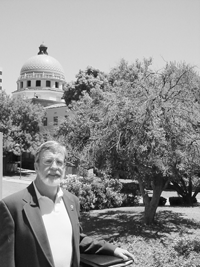While millions of Iraqis flee the country or move to "religiously purified" areas in Baghdad, four Tucsonans who have commented on the war annually since before it began now mostly have dire things to say.
Believing nothing good will come out of the war for the United States, Chris Demchak, a UA associate professor of public administration and policy, does see Iran benefiting.
"Iran has been invigorated," Demchak states, "and will be a regional hegemon that will play a much bigger role than it would have."
To diminish Iran's role in the Middle East and to open the door to an eventual end to the hostilities in Iraq, Demchak has supported the so-called "three-state solution" for several years. This proposal would divide the country into separate Kurdish, Shiite and Sunni nations.
"The civil war will break the country up in any case," Demchak suggests. She has also written in a recently published article: "It is easier for the West if Iran's natural allies (in Iraq) have less territory and fewer resources."
To facilitate this division of Iraq, Demchak believes American troops for a short period of time should be stationed on the defined borders of the new nations, each of which would be provided with some oil sources. After that, it will be up to the emerging countries to decide if they want war or peace.
While not perfect, Demchak writes of the three-state solution: "It is the best we can do ... and a long sight better than what they are facing now."
Republican Bill Heuisler was a war supporter in 2003; he agrees with Demchak about breaking Iraq into pieces.
"Why not split it up?" he asks. "There's no way in the world to get the Shiites and Sunnis to love each other."
Under this scenario, Heuisler envisions U.S. soldiers remaining in Iraq only to stop terrorism from spreading. "We'd form occupied, fortified areas in the country to prevent terrorists," he suggests. "I don't want any terrorism exported out of Iraq."
As for what would happen inside Iraq, Heuisler says: "Why the hell are we interfering with them? Let them kill each other."
Emphasizing he has "contempt" for Democrats in Congress who talk about cutting off funding for the war, former Marine Heuisler summaries: "The Democrats want to re-create Vietnam and make Bush another Nixon. They only care about power."
Tom Volgy--a UA political science professor and the Democratic mayor of Tucson from 1987 to 1991--doesn't think Congress will stop financing the war.
"Congress will come close to threatening to cut off funds," Volgy believes, "but won't."
Without that kind of drastic action, Volgy doesn't see the Bush administration changing course in Iraq. "If the administration doesn't pay attention to its own generals and experts as well as the public, they won't pay attention to Congress."
As a result, Volgy says: "Nothing good for us (will come out of the war), and I can't believe anything good could come out of it for the people in the Middle East. ... There are no good choices for us, and maybe not for Iraq."
This bleak picture isn't surprising to Caroline Isaacs of the American Friends Service Committee; she was an outspoken opponent of the war before it began.
"Why didn't they listen?" she wonders about the American people. "We told them. Those in the (anti-war) movement are now kind of like, 'Duh!' It seemed obvious from the start on how it was likely to turn out."
Isaacs agrees with Volgy that Congress won't cut off the flow of money for the war. "They'll kind of bluster about doing something, without doing something, until it becomes catastrophic.
"We've created an incredible mess with pretty bad consequences, whether we stay or go," Isaacs says. "There has been a worldwide erosion of U.S. legitimacy and of us taking the moral high ground."
Another ramification of Iraq, Isaacs says, is the expenditure of vast sums of taxpayer money: "There's an insane amount of money being spent which could be used on worthy causes."
Asked what the impact of the war will be 10 years from now, Volgy predicts: "Our relationships in the Middle East will be less influential, and we'll be less able to influence events. We'll be less liked than other major contenders for influence--China and Russia."
Believing the 10-year future is still to be determined, Heuisler responds: "If we turn tail and run after winning the battles, then the political impact on the U.S. will be incredible. In Iraq, a crackpot dictator (will come to power), and the Kurds will form their own country."
For her part, Demchak questions why the United States isn't trying to wean itself from its addiction to oil.
"How fast can we move to alternative fuels for transportation energy?" she asks. "If (Middle Eastern countries) didn't have markets for oil, we wouldn't care as much about them. ... We'd be less dependent on countries with no democratic background."
To achieve that goal, Demchak concludes: "Let's get the U.S. on a proactive move away from oil to renewable energy sources."








